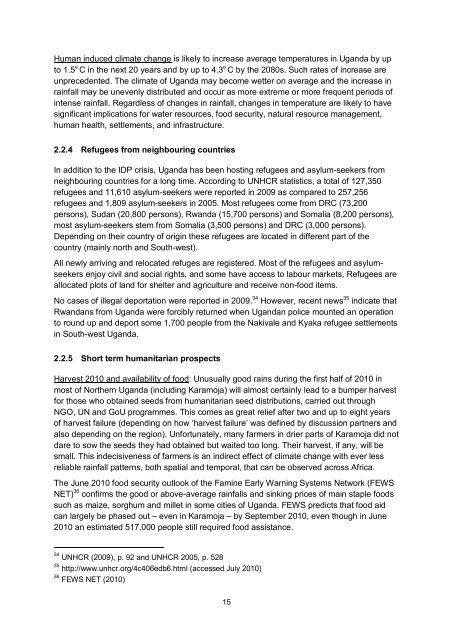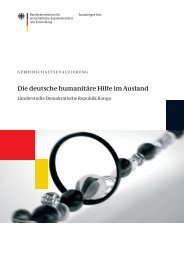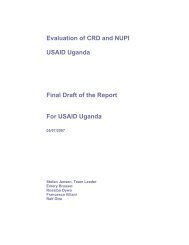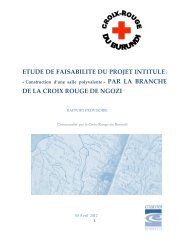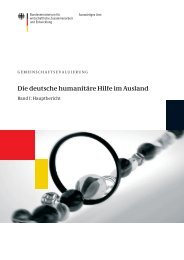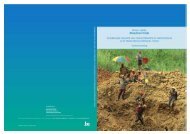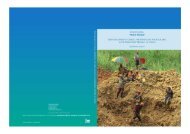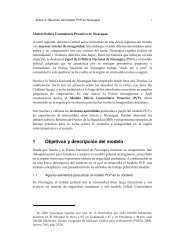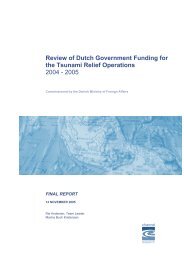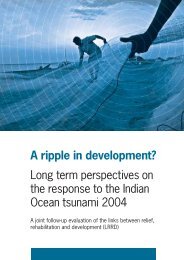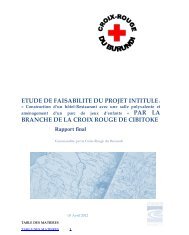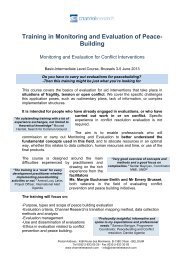German Humanitarian Aid Abroad - Channel Research
German Humanitarian Aid Abroad - Channel Research
German Humanitarian Aid Abroad - Channel Research
You also want an ePaper? Increase the reach of your titles
YUMPU automatically turns print PDFs into web optimized ePapers that Google loves.
Human induced climate change is likely to increase average temperatures in Uganda by up<br />
to 1.5 o C in the next 20 years and by up to 4.3 o C by the 2080s. Such rates of increase are<br />
unprecedented. The climate of Uganda may become wetter on average and the increase in<br />
rainfall may be unevenly distributed and occur as more extreme or more frequent periods of<br />
intense rainfall. Regardless of changes in rainfall, changes in temperature are likely to have<br />
significant implications for water resources, food security, natural resource management,<br />
human health, settlements, and infrastructure.<br />
2.2.4 Refugees from neighbouring countries<br />
In addition to the IDP crisis, Uganda has been hosting refugees and asylum-seekers from<br />
neighbouring countries for a long time. According to UNHCR statistics, a total of 127,350<br />
refugees and 11,610 asylum-seekers were reported in 2009 as compared to 257,256<br />
refugees and 1,809 asylum-seekers in 2005. Most refugees come from DRC (73,200<br />
persons), Sudan (20,800 persons), Rwanda (15,700 persons) and Somalia (8,200 persons),<br />
most asylum-seekers stem from Somalia (3,500 persons) and DRC (3,000 persons).<br />
Depending on their country of origin these refugees are located in different part of the<br />
country (mainly north and South-west).<br />
All newly arriving and relocated refuges are registered. Most of the refugees and asylumseekers<br />
enjoy civil and social rights, and some have access to labour markets, Refugees are<br />
allocated plots of land for shelter and agriculture and receive non-food items.<br />
No cases of illegal deportation were reported in 2009. 34 However, recent news 35 indicate that<br />
Rwandans from Uganda were forcibly returned when Ugandan police mounted an operation<br />
to round up and deport some 1,700 people from the Nakivale and Kyaka refugee settlements<br />
in South-west Uganda.<br />
2.2.5 Short term humanitarian prospects<br />
Harvest 2010 and availability of food: Unusually good rains during the first half of 2010 in<br />
most of Northern Uganda (including Karamoja) will almost certainly lead to a bumper harvest<br />
for those who obtained seeds from humanitarian seed distributions, carried out through<br />
NGO, UN and GoU programmes. This comes as great relief after two and up to eight years<br />
of harvest failure (depending on how ‘harvest failure’ was defined by discussion partners and<br />
also depending on the region). Unfortunately, many farmers in drier parts of Karamoja did not<br />
dare to sow the seeds they had obtained but waited too long. Their harvest, if any, will be<br />
small. This indecisiveness of farmers is an indirect effect of climate change with ever less<br />
reliable rainfall patterns, both spatial and temporal, that can be observed across Africa.<br />
The June 2010 food security outlook of the Famine Early Warning Systems Network (FEWS<br />
36<br />
NET) confirms the good or above-average rainfalls and sinking prices of main staple foods<br />
such as maize, sorghum and millet in some cities of Uganda. FEWS predicts that food aid<br />
can largely be phased out – even in Karamoja – by September 2010, even though in June<br />
2010 an estimated 517,000 people still required food assistance.<br />
34 UNHCR (2009), p. 92 and UNHCR 2005, p. 528<br />
35 http://www.unhcr.org/4c406edb6.html (accessed July 2010)<br />
36 FEWS NET (2010)<br />
15


